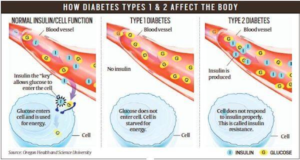In news– The Indian Council of Medical Research (ICMR) has recently released guidelines for the management of Type 1 diabetes.
ICMR guidelines-
- This is the first time the ICMR has issued guidelines specifically for type 1 diabetes, which is rarer than type 2, only 2% of all hospital cases of diabetes in the country are type 1 but which is being diagnosed more frequently in recent years.
- According to ICMR, the diet of a person suffering from Type 1 diabetes should consist of 50-55 per cent carbohydrates, 25-35 per cent fat, and 15-20 per cent protein.
- It stated that excessive restriction on carbohydrates should be avoided as it can hamper the growth of children as well as adolescents.
- Adults should consume a minimum of 130 g of carbohydrates per day to ensure adequate glucose for the brain.
- The recommended protein intake is 15 to 20 per cent of the caloric requirement of the individual.
- Exercise can help prevent obesity in individuals with Type 1 diabetes while it also mitigates the risk of developing cardiovascular diseases.
- ICMR suggested that physical activities and sports should be encouraged in Type 1 diabetes patients.
- However, increasing the intensity of exercise also increases the risk of hypoglycemia and thus should be avoided.
- Weight-bearing activities or exercises lead to higher drop in blood glucose levels than other exercises.
- While using insulin becomes a necessity for people with Type 1 diabetes, ICMR underlined some of the side-effects of insulin therapy. They are-
- Hypoglycemia.
- Weight gain.
- Lipohypertrophy and lipoatrophy.
- Insulin site infection.
- The guidelines insisted that individuals should use a clean and needle of the right size to avoid and infections and pain at the site of injection.
- Monitoring the blood glucose level becomes crucial in Type 1 diabetes as it helps predict the glycemic control in patients.
- It has also stated taht self-monitoring of Blood Glucose (SMBG) should be done and is recommended at 4-6 times a day for adults. Youngsters, meanwhile, can monitor their BG level 2-3 times a day.
What is Type 1 diabetes?
- Type 1 diabetes is a condition where the pancreas completely stops producing insulin, the hormone responsible for controlling the level of glucose in blood by increasing or decreasing absorption to the liver, fat, and other cells of the body.
- This is unlike type 2 diabetes which accounts for over 90% of all diabetes cases in the country — where the body’s insulin production either goes down or the cells become resistant to the insulin.

- Insulin is a hormone that allows blood sugar to enter the cell and be used for energy in the body.
- In the absence of insulin, the blood sugar gets accumulated in the blood stream thus causing high blood sugar levels.
- The insulin deficiency is found to be more severe in Type 1 diabetes than Type 2 diabetes, while the insulin resistance in Type 1 diabetes is none or mild.
- Although Type 1 diabetes can occur at any age, it usually affects teens, children, and young adults.
- Individuals with Type 1 diabetes become dependent on insulin and other therapies to survive.
















